UK and other NATO allies urged to consider conscription as Ukraine war enters third year
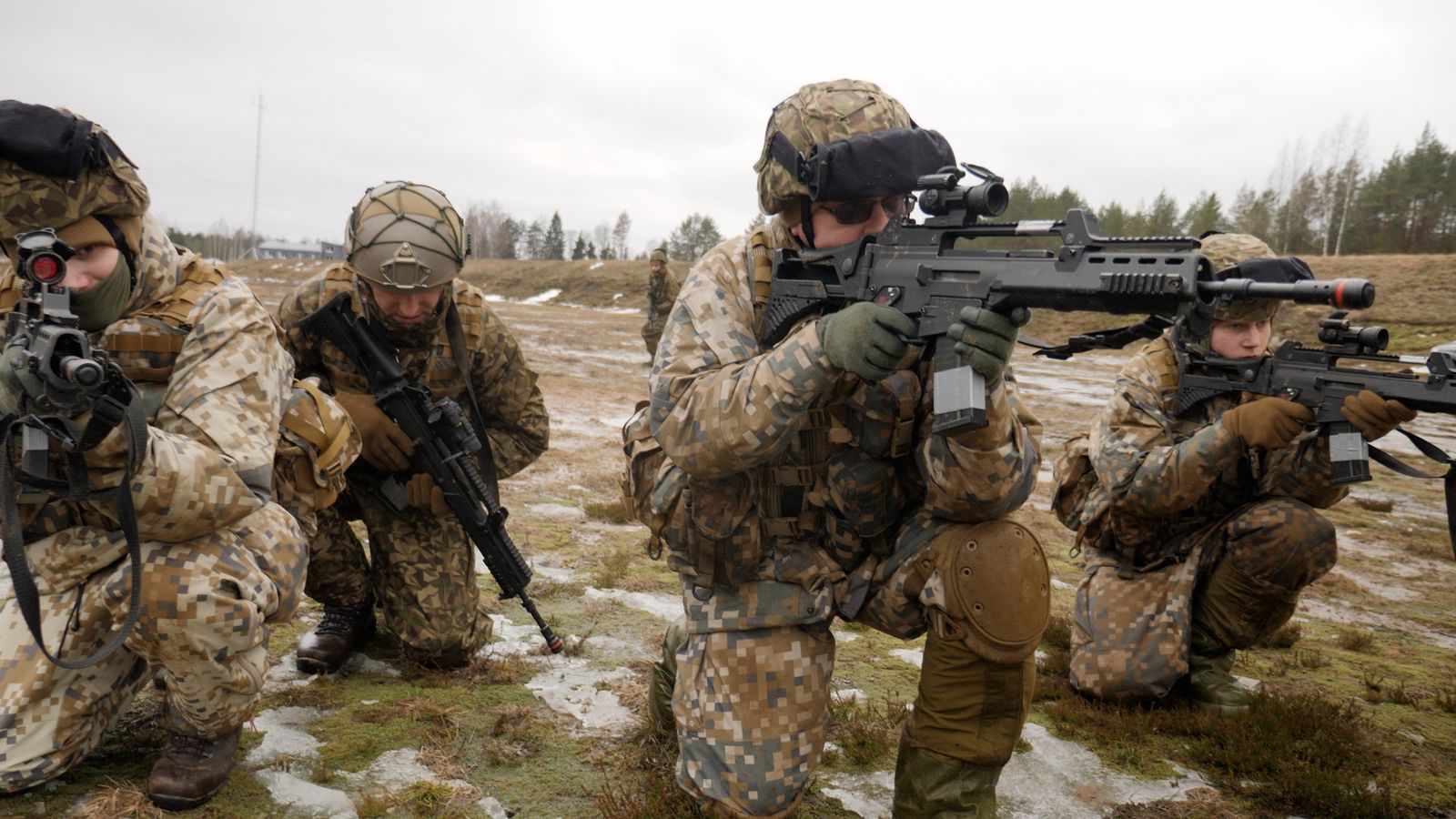
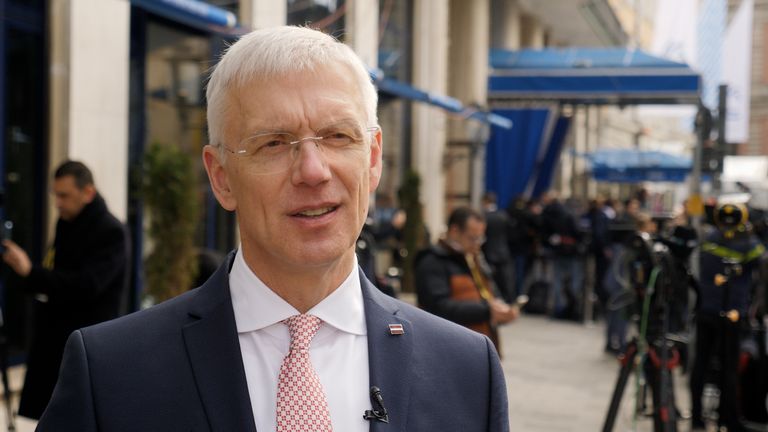
Any move to introduce conscription by Britain and other NATO allies would make a difference to Europe’s defences against Russia, Latvia’s foreign minister has said.
Krisjanis Karins said the larger the country, the bigger the difference.
Asked whether he was advocating such a step, the top diplomat told Sky News that he is “happily sharing” with colleagues the experience of his own nation, which reinstated mandatory military service last year in the wake of Russia’s full-scale invasion of Ukraine.
“We think it’s a very good idea for us,” the foreign minister said, speaking on the sidelines of a recent security conference in Germany.
“I think other NATO allies could consider it as well.”
Follow latest: Sunak and Starmer pledge support ‘for as long as it takes’
Latvia, one of the three Baltic states who are members of the NATO alliance, scrapped conscription almost two decades ago.
But it decided to reintroduce the draft as part of a plan effectively to double the size of its armed forces – professionals and reserves – to 61,000 by 2032.
“The point of the draft is to beef up capable, equipped and trained reservists,” Mr Karins, a previous Latvian prime minister, said.
Advertisement
“It’s not replacing the professional army. It’s augmenting the professional army.”
Asked whether he thought it would make a difference if the UK started conscription, the foreign minister said: “I think it would make a difference if any European country [did] – and of course, the larger countries, it would make a bigger difference.”
As for whether this was an idea he was pushing, he said with a smile: “It’s the experience that we have that I’m happily sharing with all of my friends and colleagues.”
But UK Defence Secretary Grant Shapps, who also spoke to Sky News at the Munich Security Conference last week, sounded less than keen about even training citizens voluntarily – an idea the head of the British Army appears to support – let alone mandatory military service.
“We have a professional army of professional armed forces. It’s really important that they are trained to the highest possible standards,” Mr Shapps said in an interview.
“Everyone knows that in a wartime – First World War, Second World War – scenario, of course, countries have to make other arrangements.
“That’s not the position we’re in now. We have absolutely no plans to do that now. And so that’s not something which is on the agenda currently.”
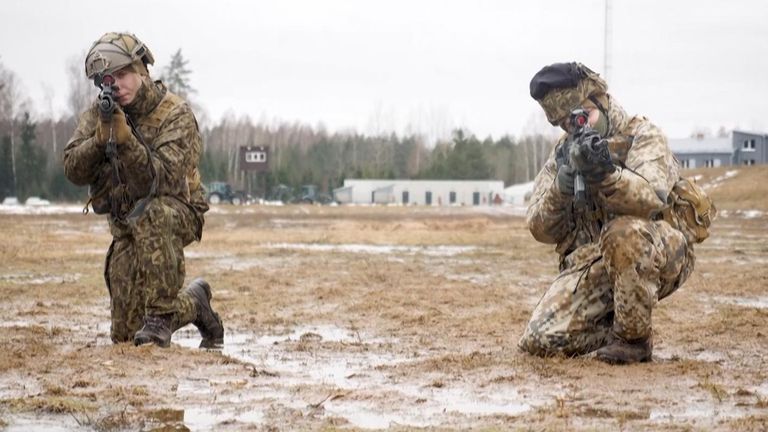
Yet a Latvian general explained how conscription is about much more than simply generating fresh boots on the ground – it is also about growing a sense of national service and a desire for each citizen to do their bit to help protect the country.
“Everyone has the right to serve – an obligation to serve – the nation,” said Major General Andis Dilans, the Chief of the Joint Staff of the National Armed Forces, Latvia’s second most senior commander.
“This is really the cornerstone of democracy,” he said in an interview in the Latvian capital Riga.
“Therefore, we looked at this not just as a war-fighting force of the conscription, but looking at the connection between the public and the military in case of crisis, in case of war.”
Sky News was invited to visit a training base in southeast Latvia, close to its border with Belarus, a close Russian ally, where a mix of conscripts and other recruits were going through a three-week basic training course with the National Guard.
The National Guard is a branch of the armed forces that is made up of volunteers. At a time of war, they would offer support to the professional military.
“Bam! Bam! Bam!” the recruits shouted, rifles raised, mimicking the sound of gunshots, as they practised a response to an ambush on a muddy shooting range surrounded by forest.
Read more:
British fighters reveal why they have returned to Ukraine
Estonia’s volunteer army warns about Russia
Russia takes complete control of Ukrainian city
Was lack of ammo to blame for Russia taking Avdiivka?
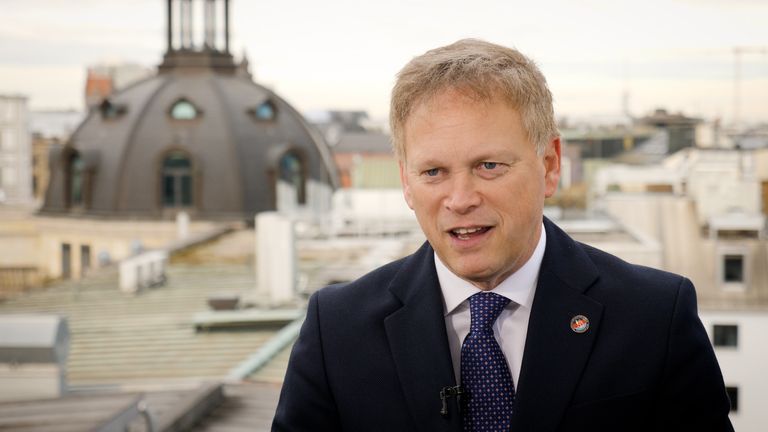
One group of soldiers provided cover, as a second group moved forward, stopped and then took their turn to provide cover as their colleagues advanced.
Edging close to the site where their pretend enemy had launched the ambush, the troops lobbed an imaginary grenade and hit the ground to brace for what would – if done for real – be a deadly impact, before scrambling forward to press on with their counterattack.
Eduard, 18, was one of seven conscripts among the group of about 20 on the range. All seven were voluntary conscripts, rather than being ordered to serve.
“I think that every man in the world needs to at least try military life,” said Eduard.
Conscripts can choose to go through a solid 11 months of training or stretch it out during five years, in between their civilian lives.
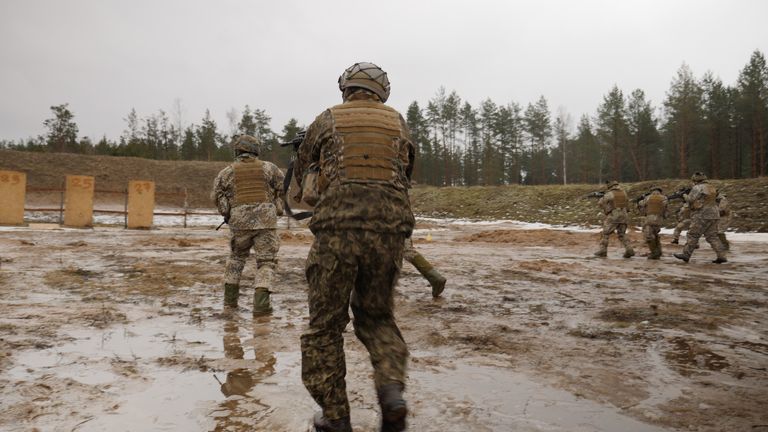
Eduard said he had decided to do the latter so he could continue his studies as well.
As for what he would do if Russia attacked, the young man said: “I will defend my country.”
Maxim, 21, a second conscript, was also enthusiastic about his limited time in uniform.
“I’d recommend that everyone samples the emotions and experiences of military life, then – if they like it – maybe they will seek to join the armed forces full time,” he said.
A total of 39 trainees were going through the basic training course at the Meza Mackevici base of 3rd Latgalian Brigade, National Armed Forces
Split into smaller units of nine to 12 people, they train, eat and sleep together.
Each day starts at 6am and ends at 11pm.
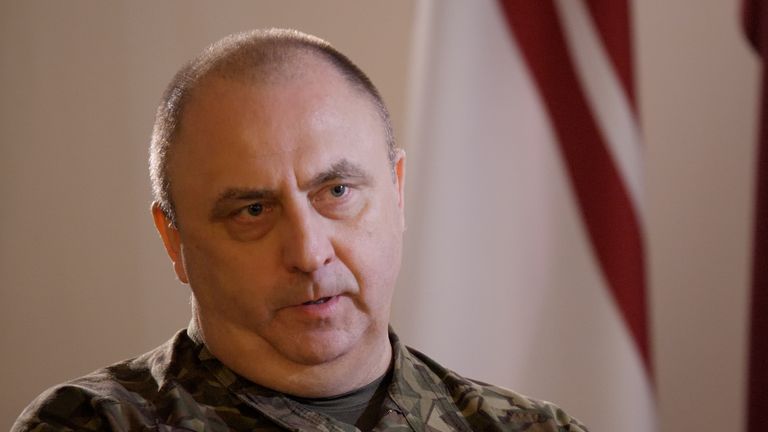
The trainees sleep on bunkbeds in makeshift dormitories that line a one-storey hangar. A canteen is in a second hanger, serving up breakfast, lunch and dinner.
Each morning, they sing the national anthem on a parade ground before three tall flag poles displaying the colours of Latvia, NATO and Ukraine – the war in that country, a constant reminder of why all three Baltic states are doing so much more to mobilise their people.
One instructor, a professional soldier who was sipping soup from a bowl during his lunchbreak, offered his perspective on conscription.
“I think that the most important thing is to awaken the desire to protect and defend your country,” said Staff Sergeant Gunars Brencis, 36.
“[It is] to awaken the patriots in them so that they have the courage to stand up against the enemy if needed.”